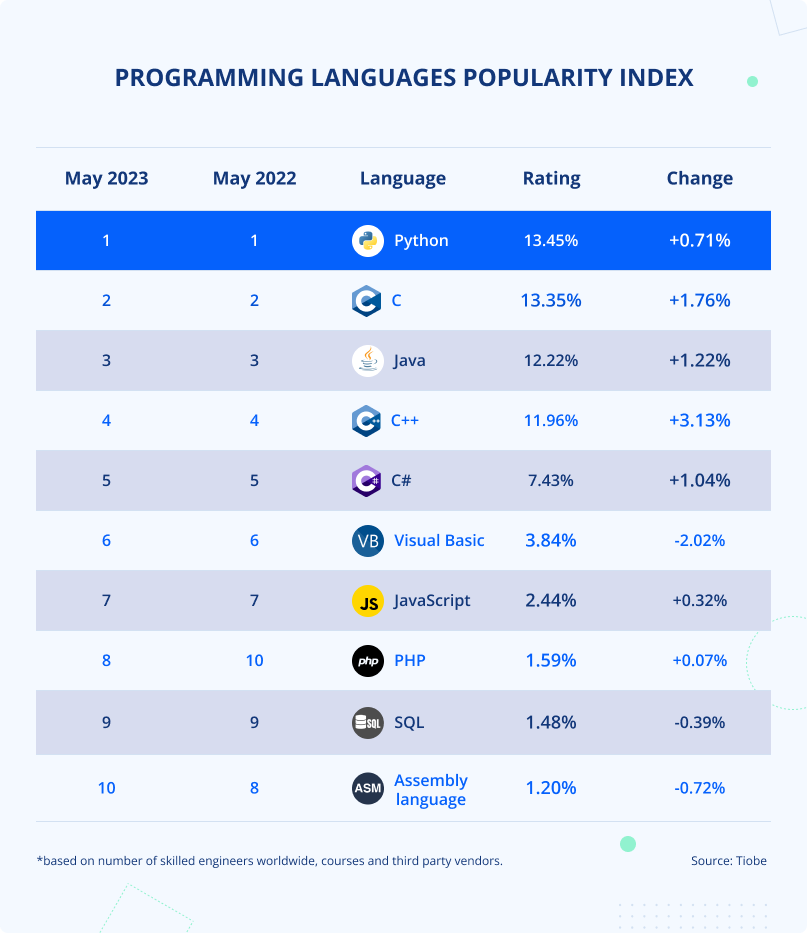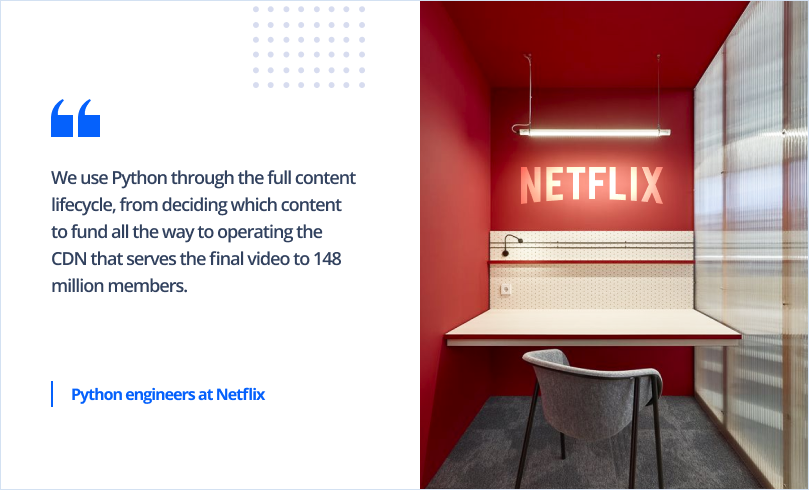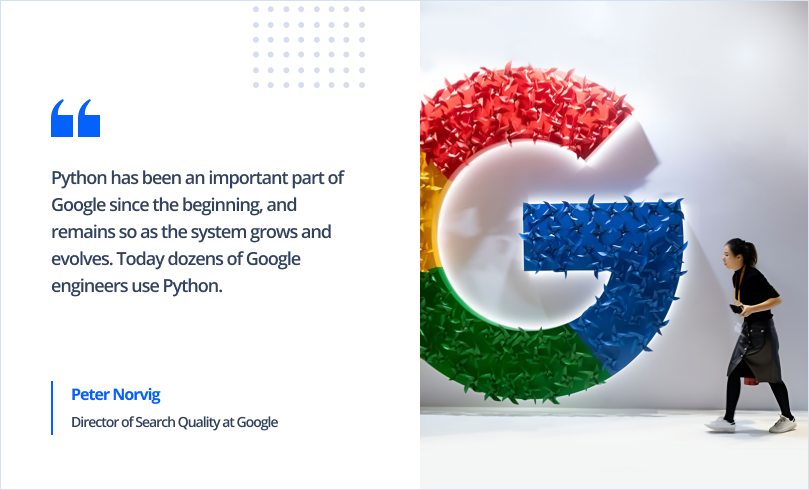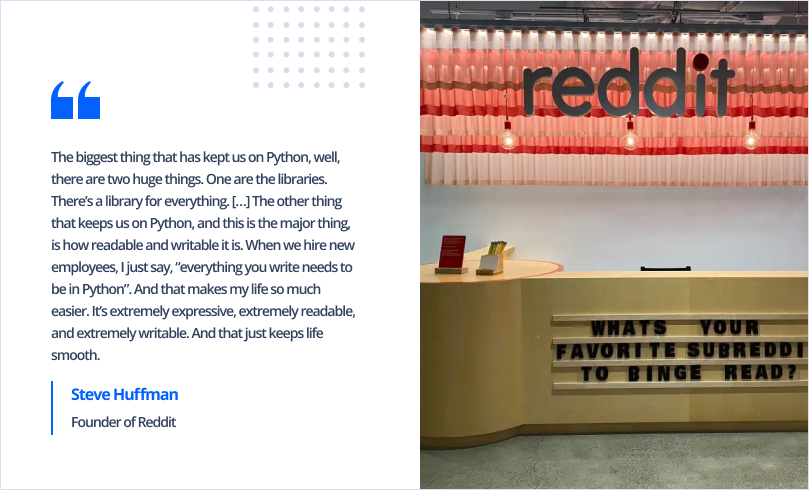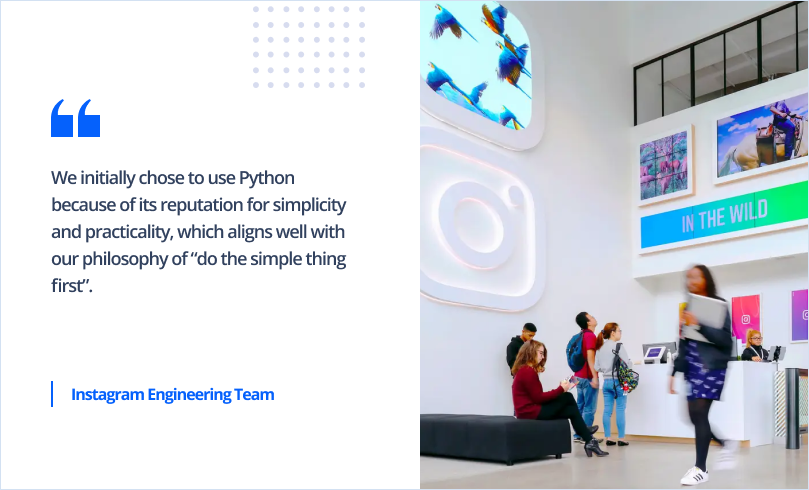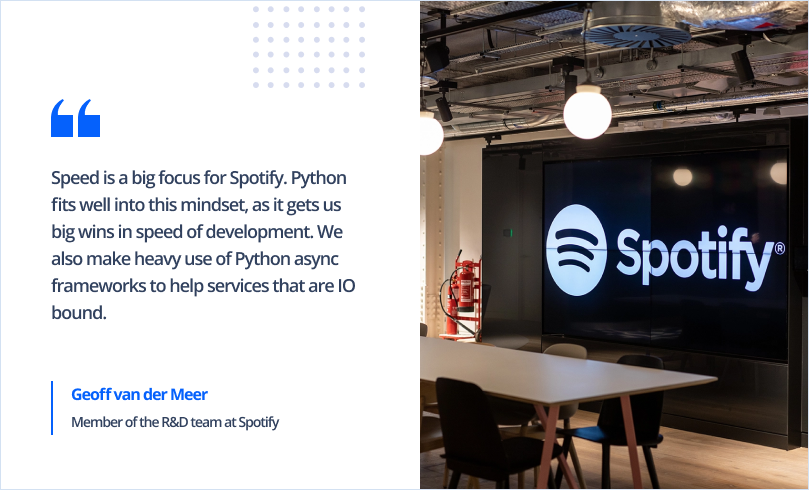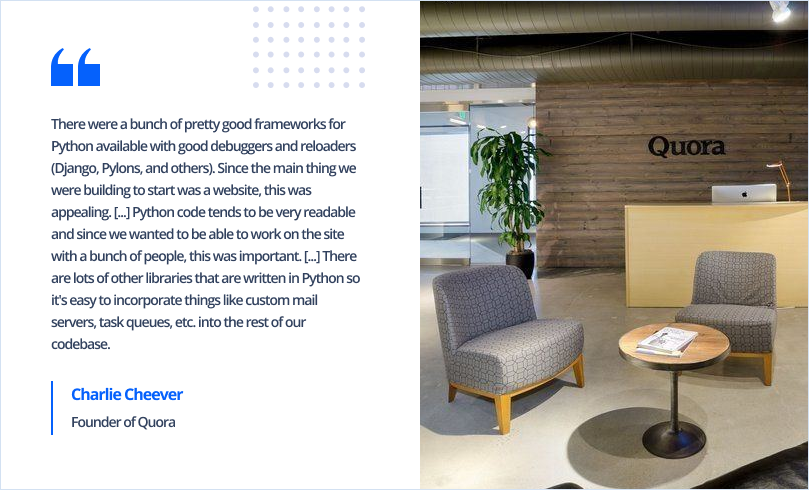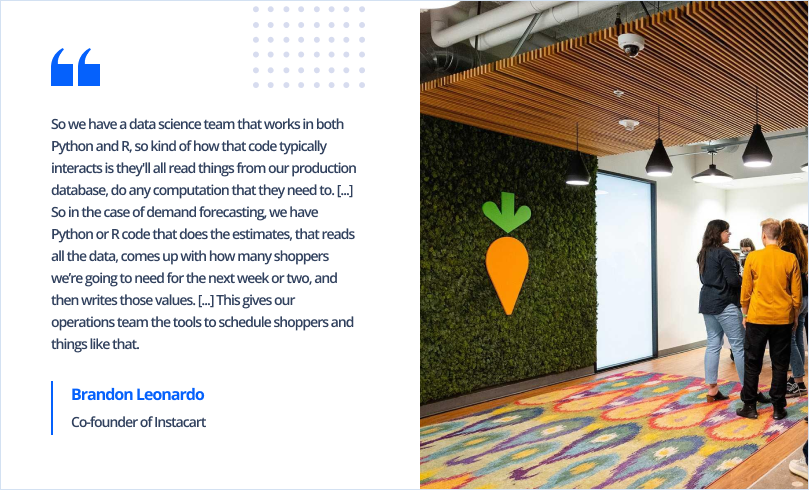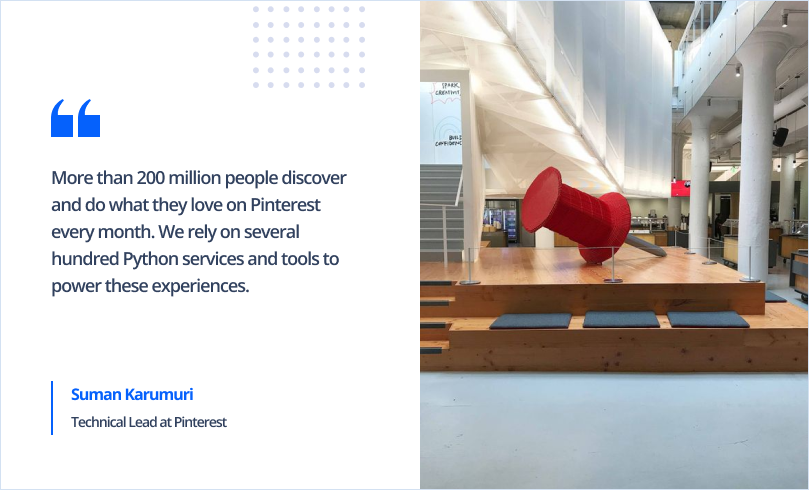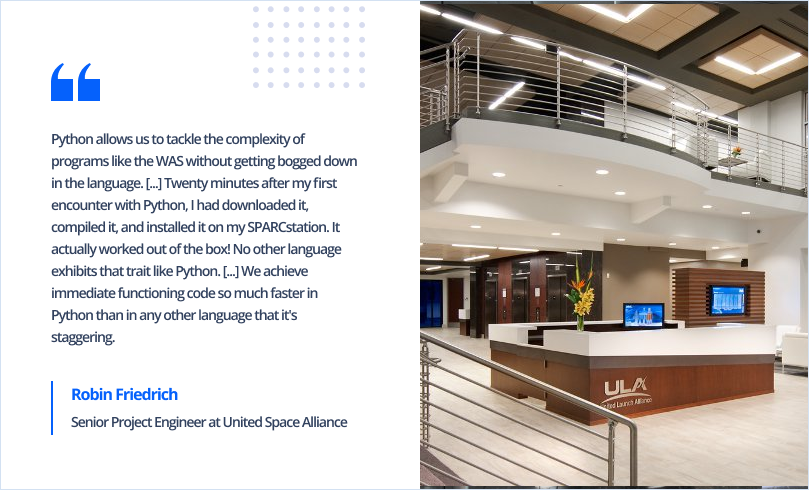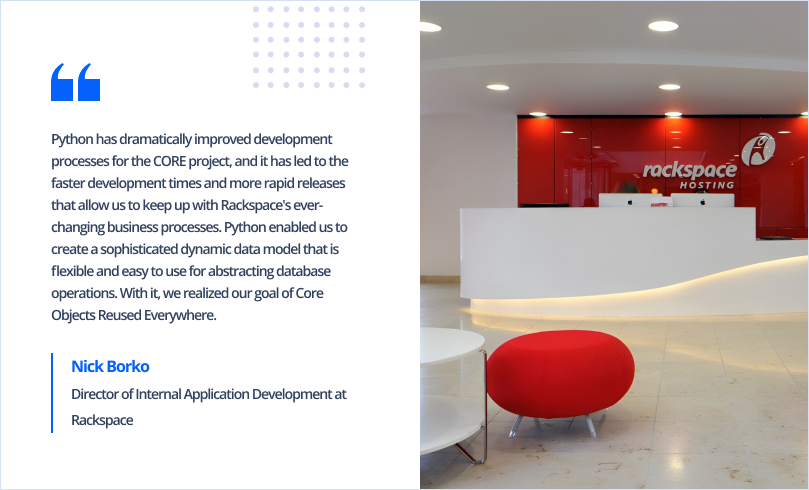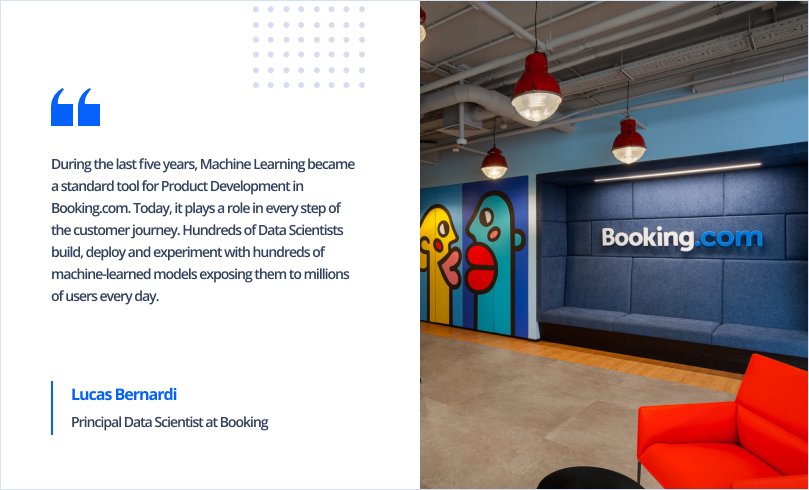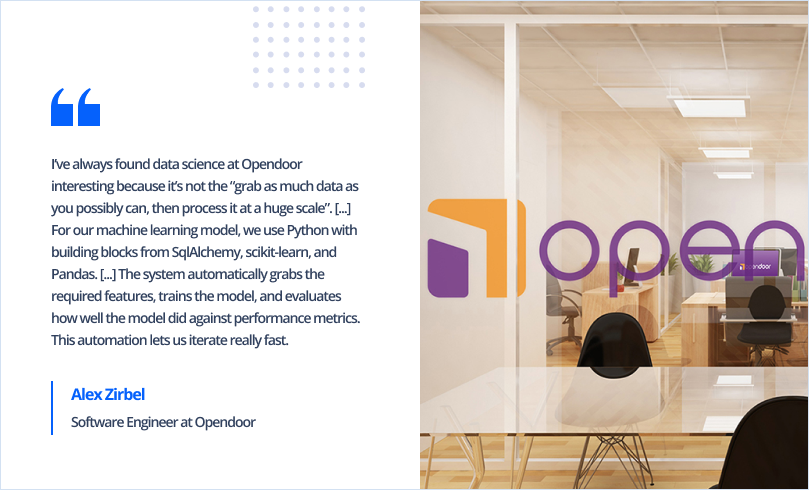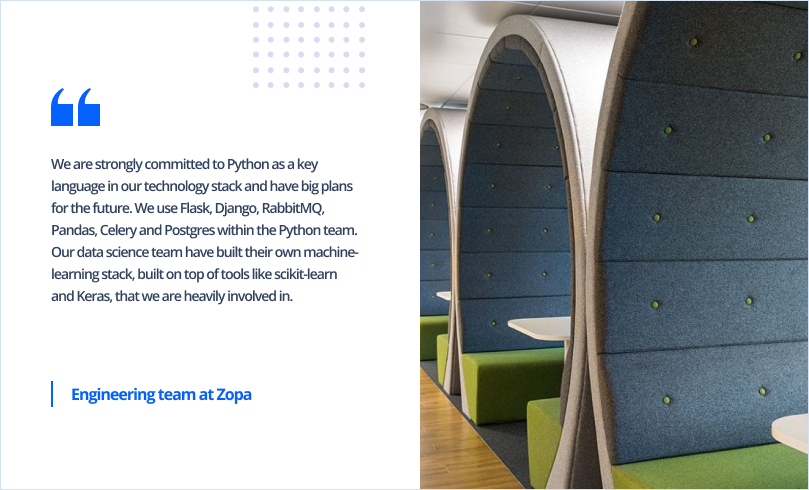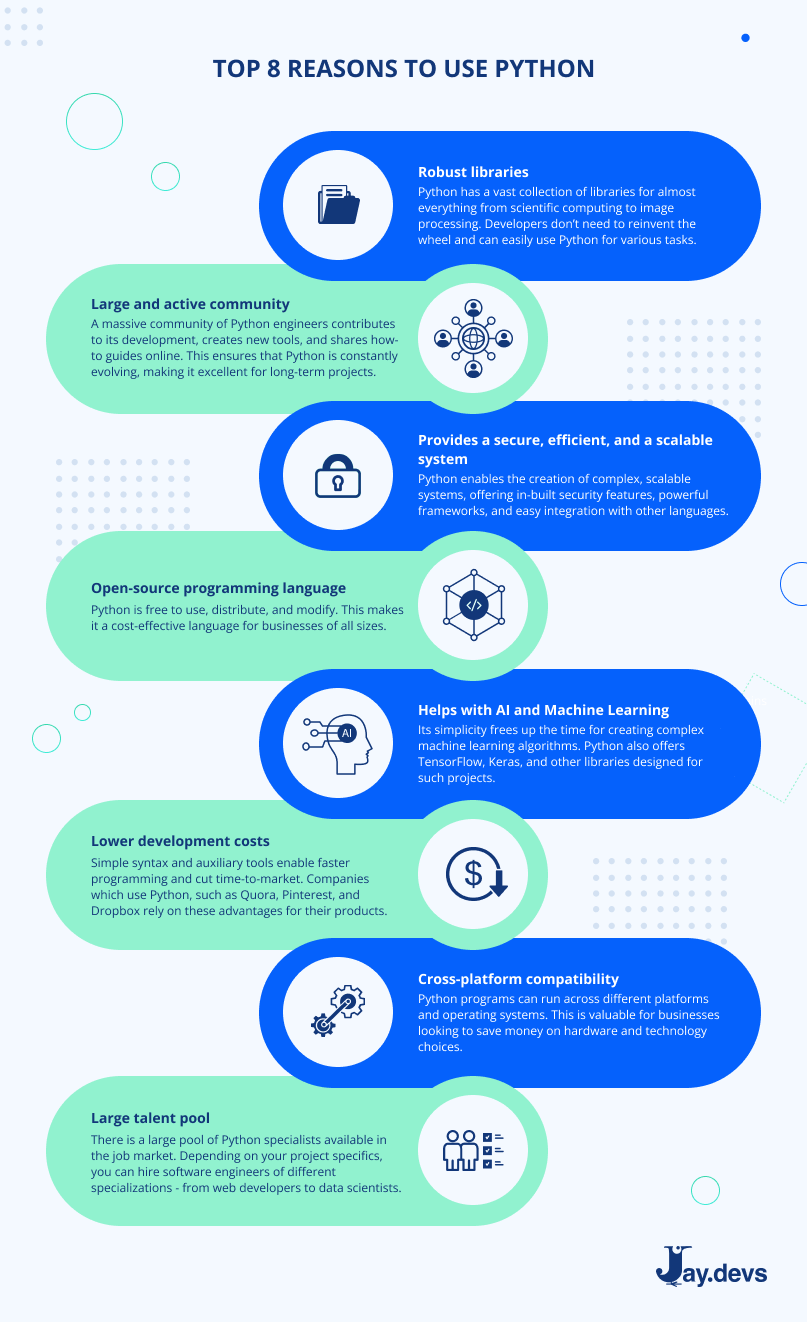Python has gained tremendous popularity and is widely used for web applications, mobile and desktop development. But what is Python mainly used for?
In this article, we’ll explore which big companies use Python and why. In addition, we will delve into 30 top Python uses in business and how this programming language can make your project successful and profitable.
What is Python?
Python is an object-oriented programming language with concise and simple syntax. It was created by Guido van Rossum in 1991 with a vision of “language to be suitable for everyday tasks and allowed for short development times.”
Python is a versatile language. It provides extensive libraries and frameworks, easily integrates with other programming languages, and is used across different industries ranging from social media to Fintech.
Furthermore, it is the most preferred language for complex calculations and data analysis. In other words, it is a popular programming language for Machine Learning, Data Science, and Artificial Intelligence solutions.
Given its flexibility and versatility, Python’s popularity has steadily increased since its inception. According to the TIOBE index, it now leads the charts as the most popular technology:
30 Companies that Use Python
So, which companies use the Python programming language? Listed below are 30 market giants that adopted this technology at scale and managed to level up their projects.
1. Netflix
Netflix is a leading video streaming service with over 230 million subscribers globally.
To improve user experience and retention, Netflix uses Python to analyze user viewing history and provide personalized suggestions. Netflix engineers also use it to forecast audience size, viewership, and other metrics for platform development.
Python is used for test automation and auto-remediation of issues within the platform to enable fast and efficient delivery of new features.
Netflix is among companies using Python as a core language of their entire tech stack and for nearly every edge of the platform.
2. Google
Google, the world’s leading search engine, is a well-known Python software company.
Python has been a major language at Google since the company’s inception and remains a vital technology alongside C++ and Java.
Python assists Google across most of their web services. For example, it’s used for analytical algorithms within search engines and around YouTube for various tasks, such as video processing and data analysis.
Being simple and naturally applicable to ML and AI, Python helps Google in the effective development of cutting-edge solutions, including robotics projects.
3. Dropbox
Dropbox is a cloud-based platform for storing and sharing files across devices. The platform started with 2000 users and expanded to 200+ million.
Dropbox use Python for its cross-platform support and quick app development cycle. This allowed for the quick implementation of new features, which was critical to Dropbox’s early and rapid scaling.
Currently, Python powers most of the Dropbox experience with 5 million codes that the company keeps scaling.
4. Stripe
Stripe is a company that helps businesses process payments online. They provide services for subscription management, invoicing, and fraud prevention.
Stripe is a company using Python for their web and mobile application programming interfaces (APIs). They chose Python as it is efficient for huge calculations and data processing required for fintech products.
5. Reddit
Reddit is one of the most massive social news aggregation and discussion websites, with about 430 million monthly users.
Reddit decided to move from Lisp to Python when it started to grow in traffic. As a result, Python helped in handling large amounts of users while keeping the website fast. The platform now uses Python for the entire infrastructure, including caching system, search engine, message queue, and more.
Python’s rich ecosystem of libraries and readable syntax have been instrumental in Reddit’s success:
6. Instagram
Another big player among companies using Python is Meta. They use it for Instagram — the largest social network with over 1 billion monthly users.
Initially, the platform decided to leverage Python for its practicality:
As the platform grew, it started to receive more users and interactions. The company created its own Python-based service, Cinder, that powers various features such as notifications, email sending, and image processing without compromising the app’s performance.
Instagram also uses Django — Python’s framework for web solutions — known for its robustness and high security.
7. Spotify
Spotify, the world’s largest music streaming service, has more than 280 million monthly users. This is the company using Python for data analysis and backend services.
Spotify leverages powerful Python to enhance Radio and Discover functions for users. Approximately 80% of Spotify’s backend services are written entirely in Python, while tech professionals admit its exclusive productivity in development:
8. Facebook
Facebook is a giant social network platform owned by Meta with a constantly growing audience. In 2022, the daily active users reached 2 billion.
Back in 2009, Facebook started using Tornado — a web server framework. It allowed Facebook to quickly and effectively handle large amounts of simultaneous traffic.
Now, the Python language is the core of Facebook: it makes up 21% of the whole codebase. It is a key component in Facebook’s backend system, ensuring that the platform is up and running.
9. Quora
Quora, a popular question-and-answer website, is another example of a company who uses Python for its simplicity and speed of development.
Quora founders checked alternatives such as Java, Scala, and C#. They ended up with Python due to its vast ecosystem, good compatibility with other technologies (JavaScript, for example), and overall efficiency:
10. PayPal
The list of companies that use Python cannot be complete without PayPal. It offers a platform for secure and fast online transactions.
Machine Learning teams build custom ML models and secure the platform. In particular, fraud detection and risk management are what Python is mainly used for.
The language is also used for automation and scripting tasks, such as managing the servers’ configurations, testing, and deployment automation. This updates the platform quickly and efficiently.
11. Datadog
Datadog is a cloud monitoring and analytics platform. It allows IT and DevOps teams to monitor system environments for performance, security, and more.
Python is the fundamental language used in the Datadog infrastructure. It was chosen for its productivity and support for fast numerical processing. Along with Go and Scala, Python enables accurate data processing.
12. Amazon
Amazon is a global eCommerce platform that millions of people use daily for online shopping.
The company utilizes Python in the recommendation system, employing AI and ML to analyze customer buying habits and suggest relevant products.
Amazon is also a company using Python for BigData: its high scalability and ability to work seamlessly with technologies like Hadoop make it perfect for handling massive amounts of data that Amazon deals with.
13. Instacart
Instacart is a food delivery service with over 500,000 active users and a revenue of $2M.
Instacart is one of the companies using Python for its data science features. Namely, they use libraries like NumPy and Pandas for demand forecasting to estimate how many buyers they may expect in the near future.
They also use Python for predictive modeling within logistics; for instance, figuring out how long it takes to drive from location A to location B.
14. Uber
One of the advanced companies that use Python is Uber — a popular cab booking service.
Uber uses Python for heavy mathematical calculations and provides users with accurate estimations of arrival times. The technology also helps with demand and supply predictions, and user surges as well.
Like Facebook, Uber also uses the Tornado framework to provide high app performance for thousands of simultaneous users.
15. Pinterest
Pinterest is among the largest social media platforms for bookmarking and sharing media. It is a massive web service with over 433 million monthly users.
Pinterest uses Python for its reliability and high development speed. The application even released their own Python-based tools (e.g., Pinball, pymemcache) to improve system scalability.
The web app consists of dozens of services, and Python is used to glue them together, automating tasks to keep system operation smooth.
The web app itself relies on the Django and Tornado web frameworks for high performance even while traffic leaps:
16. NASA
NASA comes up as one of the early adopters of Python technology.
NASA started using it for the Workflow Automation System to improve data management for shuttle mission planning. They considered this technology as the one of the most straightforward and effective one.
NASA keeps leveraging Python for scientific computing, data analysis, and visualization. For example, heat warning systems project uses Python to analyze temperature parameters and visualize heat maps.
Python also contributed to the Mars mission as its scripts were used to process the images and transfer them to the flight control center. Eventually, the whole world discovered Mars’s surface like never before.
17. Lyft
Lyft, a growing ride-sharing service, is another company who uses Python and has over 20 million active users.
The company’s engineering team has praised Python for its readability and huge ecosystem of tools and libraries, noting that “Lyft is a big fan of Python.”
The company utilizes NumPy, Pandas, and other ML and data analysis libraries to serve user requests, price optimization for rides, incentives allocation for drivers, fraud detection, and more.
18. Rackspace
Rackspace is a hosting company that provides businesses with storage and management of their applications in the cloud.
Initially, the company had its customer database built in PHP, which became unmanageable and hardly scalable. As a result, Rackspace turned to Python as a more adaptive and flexible technology.
With Python, Rackspace created their own framework that enabled “modularity and reusability across all systems.” It allowed Rackspace to quickly adapt to industry shifts and changes in business processes, and provide faster customer service:
19. Odoo
Odoo is an open-source business management suite containing solutions for various needs ranging from accounting to project management.
Odoo is primarily developed with Python due to its readable and simple code. The system consists of various modules and services requiring high customizability and extensibility. With Python, it is possible without spending an excessive amount of time or a large sum.
20. Booking
Booking.com is one of the world’s largest travel platforms, where millions of users can search and book plane tickets, apartments, and more.
Booking is among the companies that actively use Python for machine learning which results in continuous enhancement of the recommendation engine. Hence, customers can receive actual references, which enhances retention and loyalty.
21. Robinhood
Robinhood is a popular Crypto trading platform with millions of customers.
The company initially decided to opt for Python and Django. Python’s simplicity and readability were handy for quickly developing trading algorithms and back testing. Additionally, the Django web framework provided a secure and scalable foundation for their web platform.
22. Revolut
Another example of a fintech company using Python is Revolut — the innovative digital banking platform based in the UK.
According to the job posting on their official website, they seek Python developers for “creating data pipelines to pull data from production services into our data warehouse — powering reporting, data analytics and data science.”
Evidently, the company relies on Python for calculations and data analysis. This allows for making data-driven decisions, creating new flows and processes to improve their business.
23. Opendoor
Opendoor is a digital real estate company that buys and sells homes online.
The company utilizes Python libraries for smart and simplified machine learning models:
Bundled with other programming languages, Python helps Opendoor provide customers with accurate real estate values while also improving developers’ productivity with ready-to-use ML tools.
24. Made.com
Made.com is a large online furniture retailer with dozens of products. They work directly with designers and manufacturers, thereby expanding their partner network increasingly.
The platform required new ambitious warehouse integrations; so Made.com decided to gradually rebuild their ERP system “into a collection of microservices developed in Python and tied together through Event Sourcing.” With Python, this plan seemed not that risky, as it offers rapid software development.
25. Zopa
Zopa is another fintech organization who is using Python actively. It is a peer-to-peer lending company that provides people with simpler loan-taking.
Zopa aims to create a seamless experience for borrowers and lenders, with Python serving as the foundation for their platform. It is mainly used to develop advanced algorithmic models:
26. J.P. Morgan’s Athena
Athena is a technology platform developed by J.P. Morgan for trading strategies, risk management, and analytics.
Athena is among the companies that use Python at a “massive scale.” Initially, the language was adopted for its open-source data science and machine learning tools to enable complex data analysis and research. Now the platform has 150,000 Python modules, over 500 open-source packages, and 35 million lines of code.
Among the core advantages of Python, J.P. Morgan highlights extensive automated testing, efficiency for developers, and increased time-to-market.
27. Industrial Light and Magic
Industrial Light and Magic (ILM) is a visual effects company owned by Disney, which contributed to films like Star Wars, Jurassic Park, Terminator 2, and others.
The company used Unix shell scripting for the production process, which was becoming increasingly complex. In 1996, they researched alternatives and switched to Python as “an easier to learn and use language with which to incrementally replace older scripts.”
Later, ILM embedded the language into custom apps written in C and C++, enjoying its seamless compatibility with other technologies.
ILM also benefited from portability across platforms: they could use cheaper commodity PC hardware and the Linux OS for their production control system, which resulted in substantial money savings.
28. ActiveCampaign
ActiveCampaign is a marketing platform providing email, CRM, and other automation tools. The company serves more than 180K of businesses and is continuously expanding.
In 2020, ActiveCampaign transitioned to Python, as the PHP language lacked flexibility, and the pool of developers decreased. To increase platform scalability, the company gradually rebuilt the architecture into microservices, with Python acting as a mediator between them.
To face the increasing customer needs, ActiveCampaign started to build its own ML models. Many Python libraries, such as LightFM and Airflow, were a helping hand for it.
The programming language was also a choice for a new, optimized email service:
29. Affirm
Another candidate in our list of who uses Python and why is Affirm — a fintech company providing online loans and credit cards. They offer web and mobile applications so people can buy products online and pay later.
Python is well-suited for web development and Affirm uses Flask micro-framework to power their web application. The company also heavily relies on open-source machine learning tools used to predict loan repayment.
30. Disqus
Disqus is a popular online commenting system with over 35 million monthly users.
This platform was initially built in Django, as this framework offered ready-to-use tools for rapid development and high security. Over time, the company scaled its platform to handle 8 billion page views per month and 45k requests per second.
Python itself is used for managing thousands of comments whereas parsing, computation, and publishing of data are handled by its programs.
The Advantages of Using Python for Your Next Web, Mobile, or Desktop App
We’ve considered top-market Python companies like Spotify, Amazon, Uber, and others. To wrap up, here are some key reasons why big market players choose Python for their projects.
1. Robust libraries
Python has a vast collection of libraries for almost everything from scientific computing to image processing. As a result, developers don’t need to reinvent the wheel and can easily use Python for various tasks.
2. Large and active community
A massive community of Python engineers contributes to its development, creates new tools, and shares how-to guides online. This ensures that Python constantly evolves, making it excellent for long-term projects.
3. Provides a secure, efficient, and a scalable system
Python enables the creation of complex, scalable systems, offering in-built security features, powerful frameworks, and easy integration with other languages.
4. Open-source programming language
Python is free to use, distribute, and modify. This makes it a cost-effective language for businesses of all sizes.
5. Helps with AI and Machine Learning
Its simplicity frees up time for creating complex machine-learning algorithms. Python also offers TensorFlow, Keras, and other libraries designed for such projects.
6. Lower development costs
Simple syntax and auxiliary tools enable faster programming and cut time-to-market. Companies which use Python, such as Quora, Pinterest, and Dropbox, rely on these advantages for their products.
7. Cross-platform compatibility
Python programs can run across different platforms and operating systems. This is valuable for businesses looking to save money on hardware and technology choices.
8. Large talent pool
With its growing popularity, there is a large pool of Python specialists available in the job market. Depending on your project specifics, you can hire software engineers of different specializations, such as web developers, data scientists, production engineers or data analysts.
Conclusion
Now you know what companies use Python and how they benefit from it. Relying on their practical experience may help you make an informed decision.
With Python, software developers can focus on rapid and flexible project development while getting a powerful tool to tackle various tasks ranging from test automation to web development and complex data analysis.
If you have a project in mind yet lack professionals — we are here to help. Hire expert Python developers with JayDevs and kick-start your project as soon as possible!





